
Bifocal vs. Progressive Lenses - See The Difference
As we age, the lens of our eye becomes less flexible and thicker, and the surrounding muscle fibers become less elastic. This can make it difficult to read the fine print found in newspapers, magazines, books, and on smartphones. This normal loss of the ability to focus at close distances, which usually begins around age age 40, is called presbyopia. Bifocal and progressive lenses are multifocal eyeglass lens designs that provide wearers with multiple prepscription zones - including a reading-specific prescription - enabling them to see clearly as they grow older. However, while similar, bifocal and progressive lenses differ in several key ways. Understanding how they differ can help you make an informed decision when the time arrives to invest in multifocal eyeglasses. Schedule an appointment with our Edmonton optometrists and opticians today to learn more about multifocal eyewear options.
Schedule An Exam Our Optometrists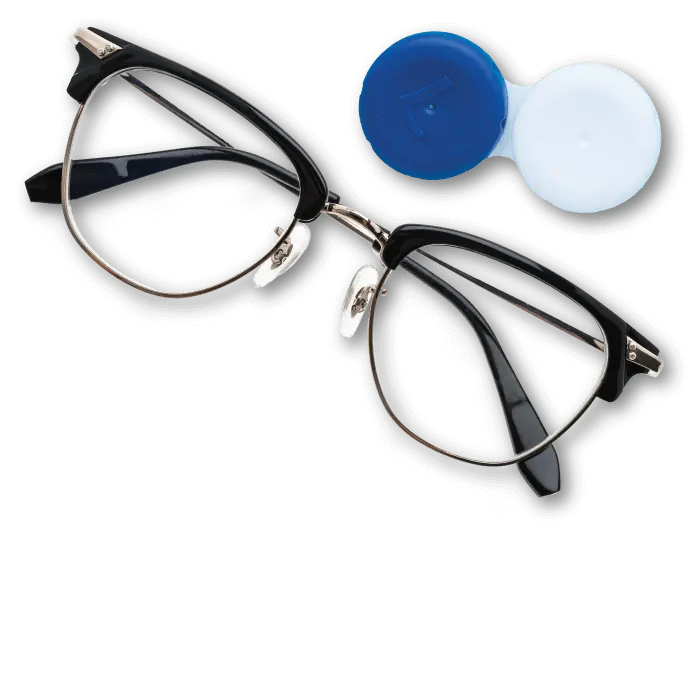
(780) 473-6123
Progressive vs. Bifocal Lenses:
What Are Bifocal Lenses?
Bifocal prescription lenses, also known as lined bifocal lenses, are eye glass lenses that have two distinct lens powers separated by a distinct, visible line. Bifocals are typically prescribed for individuals who need glasses for both near (e.g., reading) and far (e.g., driving) vision and have a stronger prescription for one of these distances. Bifocals work by having two prescriptions integrated one lens, with the near vision prescription at the bottom of the lens and the far vision prescription at the top. Traditional bifocal lenses are typically made with a visible line separating the two prescriptions, which allows the wearer to switch between the two prescriptions by looking through the appropriate part of the lens. Bifocal wearers simply look slightly downward along their cheek line to obtain clear reading vision. Looking straight, along the horizontal plane, offers the clear distance vision needed for driving.
Learn More About Bifocal Eyeglass Lenses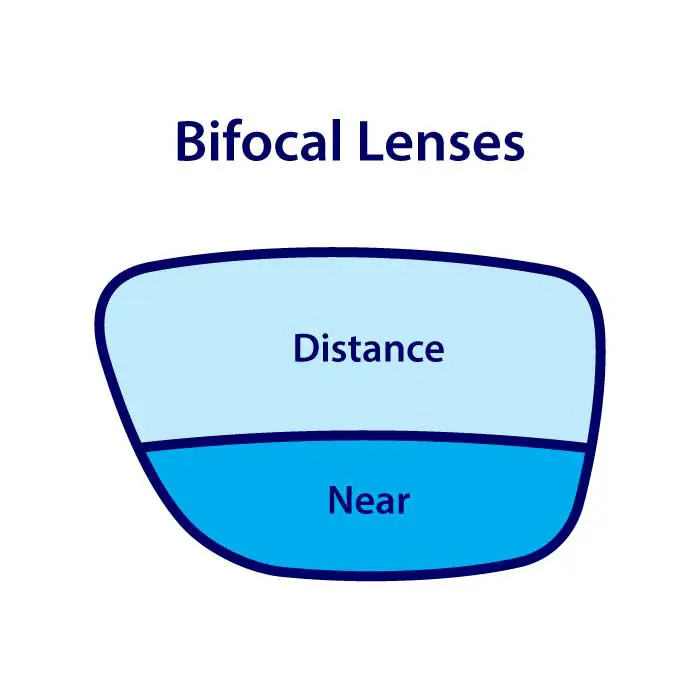
Progressive vs. Bifocal Lenses:
What Are Progressive Lenses?
Progressive prescription lenses are modern multifocal lenses with three benchmark focal zones: distance- (e.g., driving), intermediate- (e.g., computer), and near-vision (e.g., book reading). Unlike bifocals, progressive lenses do not feature visible lines between each focal zone. Instead, they have a seamless, invisible design where the magnification power progressively changes throughout the lens from distance vision (e.g., driving) at the top to near vision (e.g., reading) at the bottom. Advancing from single vision lenses to multifocal lenses requires the eyes, brain, and head to recalibrate how they work together to offer the clearest vision at every distance. However, new digital freeform progressive lenses, which offer the widest, distortion-free viewing areas, makes adapting to multifocal lenses considerably easier.
Learn More About Progressive Eyeglass Lenses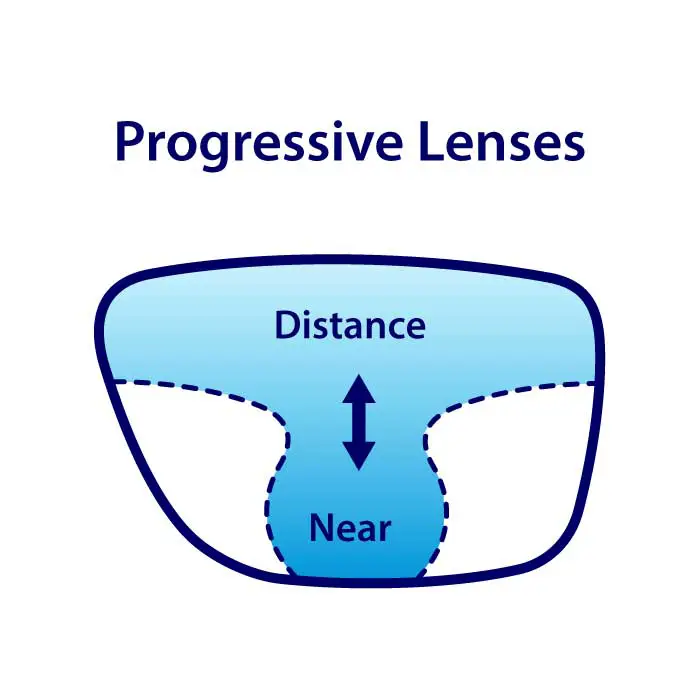
Progressive vs. Bifocal Lenses:
The Main Advantages of Progressive Lenses Over Bifocal Lenses
Compared to bifocal lenses, the continuous, seamless design of progressive lenses offer individuals several important performance and aesthetic benefits:
- Progressive lenses provide clear, crisp vision at all distances - not just the 2 offered by bifocals.
- Progressive lenses eliminate the frustrating image shift/jump experienced with bifocals.
- Progressive lenses do not have the visible lines of bifocals, offering a more youthful appearance.
- Modern digital freeform progressive lenses can be personalized to an individual's favourite activities and unique lifestyle preferences.
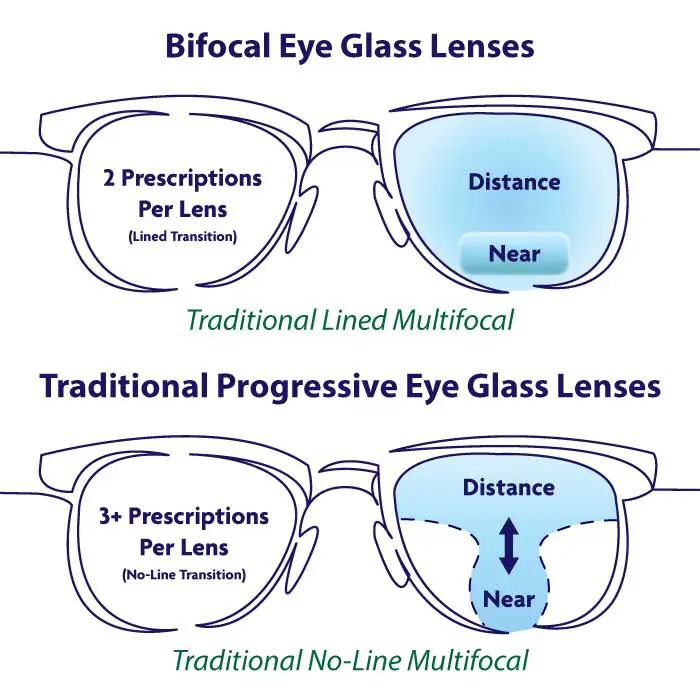
Bifocal vs. Progressive Lenses
A Comparison of Bifocal & Progressive Lens Features
| Feature | Bifocal Lenses | Progressive Lenses |
|---|---|---|
| Design | A visible line separates near and distance focal zones. | Gradual transition from near to intermediate to distance vision. |
| Seamless Transition | A distinct (i.e., discrete) jump between near and distance focal zones. | A seamless (i.e., continuous) progression between focal zones. |
| Cosmetic Appeal | Visible lines can produce an age-defining look. | No visible lines offer a more aesthetic look. |
| Adaptation Period | Users may adapt more quickly to the distinct (i.e., discrete) segments. | May require an adaptation period to get used to the establish focal sweet spots. |
| Field of Vision | Clear separation may create a more constrained visual field. | Digital freeform progessives offer a wider field of vision without interruptions. |
| Intermediate Vision | No portion of the lens devoted specifically to intermediate vision - it must share the near or distance segment. | Provides a dedicated zone for intermediate vision (i.e., computer distance). |
| Usage Variety | Versatile but may require head tilting to find the proper segment. | Suitable for various activities, including reading, computer work, and driving. |
| Customization Options | Limited customization options compared to progressives. | Can be customized for specific visual needs. |
| Cost | Often, more affordable than comparable progressive lenses. | Typically, more expensive due to more advanced technology, especially when digital freeform progressives. |
| Versatility | Suited for users who primarily switch between near and distance vision. | Ideal for those who need a range of focal lengths. |
Progressive & Bifocal Lenses:
Progressive & Bifocal Lenses Require Precision Measurements
Contrary to what some online vendors may claim, crafting multifocal lenses that provide clear, high-definition vision requires numerous precise measurements. These measurements include pupillary distances for both near and distance focal lengths, the optical center, heights, vertex (the distance of the eye from the back of the lens), pantoscopic tilt (the angle of the lens from vertical), and wrap angle (the angle at which the lenses curve around the head). These measurements are unique to each person, taking into account individual biology, behavior, frame type, frame fit, and prescription. To get the most accurate and personalized measurements, it is important that the selected frame first be properly fitted and professionally adjusted and that modern digital tools be used.
Schedule A Professional Eye Glass Fitting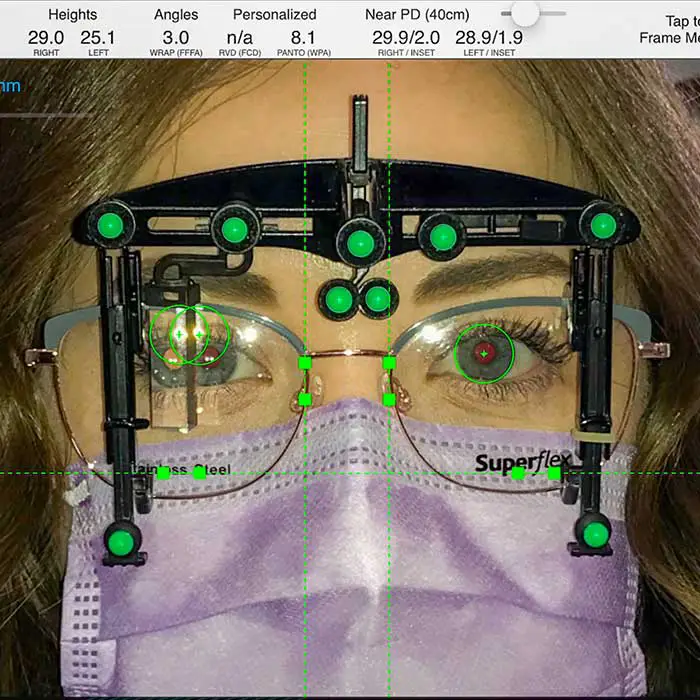
Multifocal Eyewear.
A Contact Lens Alternative to Bifocal & Progressive Lenses
Multifocal contact lenses (including bifocal contacts) contain different power zones for near and far vision to correct for presbyopia as well as nearsightedness or farsightedness. Some multifocal lenses also correct for astigmatism. Bifocal contacts lenses include two prescriptions in the lens, while multifocal contact lenses incorporate a range of powers in the lens. These contact lenses are the equivalent to bifocal and progressive eyeglass lenses.
Schedule a V-eye-P Contact Lens Fitting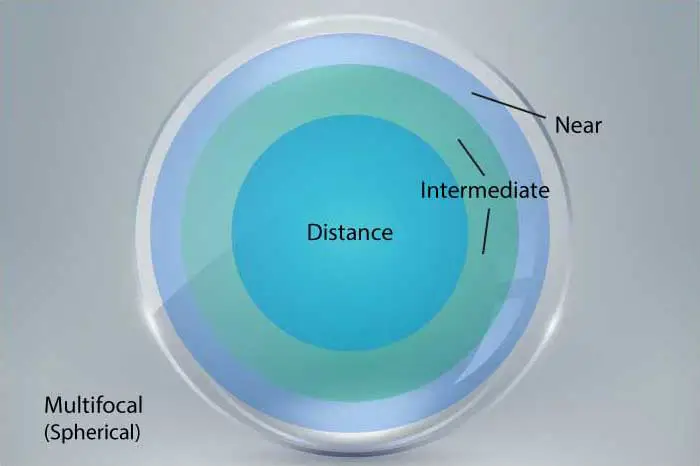
Prescription Lens Brands
Bifocal Lens Enhancements & Alternatives

Progressive Lenses
Looking of a multifocal lens with no visible lines between focal zones? Progressive lense from our Edmonton optical may be the solution for you.

Performance Lens Coatings
The performance and lifespan of your prescription glasses can be enhanced with anti-scratch and anti-reflection lens coatings.

Anti-Fatigue Lenses
Not yet 40, but experience tired and strained eyes when multitasking? See relief and relaxed vision with anti-fatigue glasses that make reading easy.
Frequently Asked Questions
Our Edmonton Optometrists
Searching for an optometrist in Edmonton? Our experienced Edmonton eye doctors use advanced modern technologies and devote upwards of 500% more time towards providing personalized patient care than elsewhere so that they can see more and ensure that you may never see less. Position yourself to see the future with a visit to our eye clinic and Edmonton's best eye care!

Dr. Jennifer Ash, OD
Dr. Jennifer Ash is the Resident Optometrist at Eye-deology Vision Care. Dr. Ash provides patient care 5 days a week. Read more about Dr. Ash.

Dr. Ruhee Kurji, OD
Dr. Ruhee Kurji is an Associate Optometrist at Eye-deology Vision Care. Dr. Kurji provides patient care Tuesdays & Fridays. Read more about Dr. Kurji.

Dr. Jade McLachlin, OD
Dr. Jade McLachlin is an Associate Optometrist at Eye-deology Vision Care. Dr. McLachlin provides patient care 5 days a week. Read more about Dr. McLachlin.

Dr. Tania Mathews, OD
Dr. Tania Mathews is an Associate Optometrist at Eye-deology Vision Care. Dr. Mathews provides patient care 2 days a week. Read more about Dr. Mathews.
Learn Why Our Edmonton Optometrists Are The Best!






